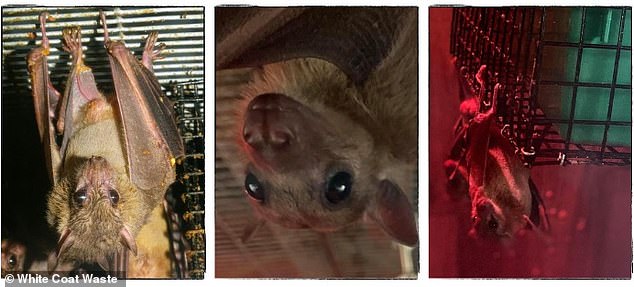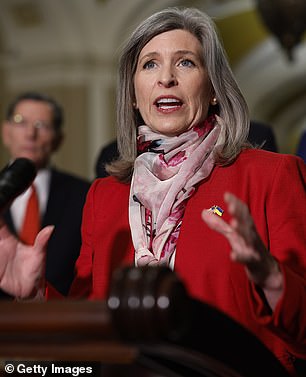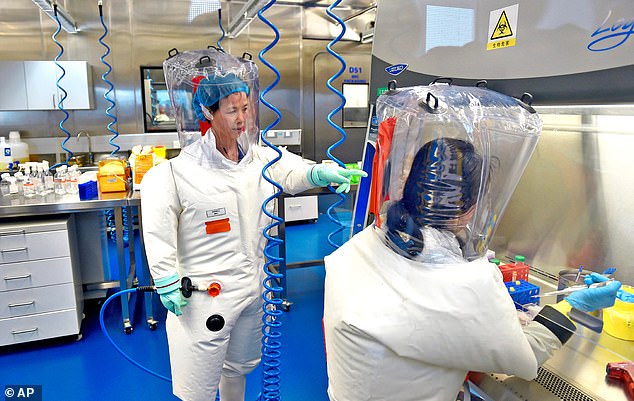Senators probe Fauci-run virus lab in Montana: Lawmakers demand answers after Daily Mail revealed US scientists were tinkering with Covid-like viruses years BEFORE the pandemic
Senators are demanding answers about a Montana lab where U.S. taxpayer money was used to manipulate coronaviruses before the pandemic.
DailyMail.com last week revealed how government-sponsored researchers infected bats with a ‘SARS-like’ virus in 2018 as part of a collaboration with the Wuhan Institute of Virology, which is at the center of the Covid cover-up scandal.
Republican Senators Joni Ernst of Iowa and Eric Schmitt of Missouri have sent a letter to the National Institutes of Health demanding they “learn more about potentially risky research” being conducted at Rocky Mountain Laboratories (RML).
The senators’ letter states: “There is no room for error and no excuse for carelessness, as even a minor accident can be catastrophic when dealing with dangerous biological agents, especially when dealing with pandemic agents.”
They sent ten questions to the NIH about the number of live bats housed in the lab and about future planned experiments.

Photos of bats caged at the Maryland zoo that sent the animals to an NIH lab for coronavirus experiments in 2018, obtained by the White Coat Waste Project
Questions include: “Will the renovated RML conduct gain-of-function research or conduct any other type of experiment that enhances the pathogenicity of infectious agents or creates chimeric versions?”
“Should biosafety incidents occur at RML, how will Congress and the public be notified?”
‘Where do RML’s laboratory animals come from? Are bats or other animals being imported from abroad?’
The senators’ letter highlighted that the lab had previously reported a number of protocol violations, including a mouse infected with an Ebola-like virus escaping from its cage and running free for a day, and unauthorized persons, including a child, wandering around near the laboratory’s primate facility. .
The CDC was not immediately notified of the breaches because, the letter states, laboratory officials “did not believe they needed to report the escaped rodent, but later did so when instructed to do so by CDC officials.”
Last week’s revelation drew outrage from politicians who said it revealed eerie links between the NIH, then headed by Dr. Anthony Fauci, and the Chinese lab feared had sparked the global Covid-19 pandemic .
It also exposed the controversial research tactics funded by American taxpayer dollars.
During the 2018 collaboration, Rocky Mountain researchers infected twelve Egyptian fruit bats obtained from a roadside shaded zoo in Maryland.
The animals were infected with a ‘SARS-like’ virus called WIV1 coronavirus to study the behavior and transmissibility of the virus. The virus had been shipped from the Wuhan laboratory the FBI believes it caused the Covid pandemic, although research has shown the new virus cannot cause a ‘robust infection’.
Rocky Mountain Laboratories was built in 1928 in Hamilton, Montana, and is a “state-of-the-art biomedical research facility,” according to the NIH. A key part of the facility is research into vector-borne diseases, such as Rocky Mountain Spotted Fever and Lyme disease, as well as coronaviruses and antibiotic-resistant diseases.
Now the lab is spending $125 million in Covid-19 funds to build a new biosafety level 2 laboratory that will support animal breeding, keeping and experimentation programs, as well as quarantine for animals classified as biosafety levels 3 and 4 .
The new facility will also expand RML’s capabilities for research with exotic species, including bats.


The senators sent a letter to the NIH with ten questions about a laboratory in Montana that conducts dangerous virus experiments on animals

Shi Zhengli – dubbed the ‘Bat Lady’ or ‘Bat Woman’ for her work on bat coronaviruses – explored the possibility that Covid could have emerged from her lab in 2020, according to colleagues
WCW Senior Vice President Justin Goodman told DailyMail.com: ‘We applaud Senator Ernst for taking swift and decisive action to hold the NIH accountable for wasting taxpayer dollars on cruel, unnecessary and potentially catastrophic animal testing at its bioagent superlab in Montana, which has a history of animal escapes and security breaches.”
The senators added that they are also concerned about the work the NIH is doing with the nonprofit scientific research organization EcoHealth Alliance.
Senator Joni Ernst told DailyMail.com in a statement: ‘We have seen the horror movie of China’s state-owned Wuhan Lab’s experiments with coronaviruses in bats, and I have worked to expose Ecohealth’s dangerous projects.
“To willingly allow the sequel to happen at taxpayer expense is downright cowardly.” But under Fauci’s leadership, Rocky Mountain Lab has ramped up its high-risk research into pandemic possibilities.
“We cannot allow what happened in Wuhan to happen on our own shores, which is why I am working to prevent future lab leaks.”
The RML has a long and ongoing history of association with the organization, which lawmakers described as “the virus-hunting group that sent U.S. taxpayer dollars to the Wuhan Institute for bat coronavirus research.”
They said EHA violated the health department’s grant policy by failing to notify officials when EHA’s subcontractor, the Wuhan Institute of Virology, amplified coronaviruses in its laboratories and repeatedly denied requests to provide documents about those experiments. which, the senators claim, could hold crucial clues about the origins of the Covid-19 pandemic.
The senators added, “Needless to say, we are deeply concerned that (the) NIH continues to invite this shadowy organization to collaborate, especially in the area of pandemic prevention studies, as the group has not prevented pandemics to date, but may have caused one.
“Honestly, it sounds way too much like a bad horror movie sequel, with the same cast of characters and a predictable plot.
‘We would therefore like to learn more about RML’s past, current and future experiments with selected agents and dangerous pathogens, as well as its collaboration with EcoHealth Alliance.’
Lawmakers’ ten questions to the NIH are:
1. What is the RML’s projected annual budget for the upcoming fiscal year and the past five fiscal years, including any additional or COVID-related funding?
2. What is the total number of live bats and other live animals currently held in RML, broken down by species?
3. What is the total number of live bats and other live animals expected to be housed in the expanded RML facility, delineated by species?
4. Where do RML’s laboratory animals come from? Are bats or other animals imported from abroad?
5. Are there any current or future RML projects involving EcoHealth Alliance or employees of the organization? List and describe all past and present RML projects involving employees representing or associated with the EcoHealth Alliance.
6. Are there any future or pending RML projects that will involve researchers, laboratories, and other institutions and individuals in the People’s Republic of China? List all past, current, and planned RML projects involving collaborations with researchers, laboratories, and other institutions and individuals in the People’s Republic of China, and describe their involvement.
7. Will the renovated RML conduct gain-of-function research or any other type of experiment that improves the pathogenicity of infectious agents or creates chimeric versions? If so, how will Congress and the public be informed of such experiments planned at RML?
8. How will Congress and the public be informed of proposed RML research involving selected agents, defined by the CDC as “biological agents and toxins determined to have the potential to pose a serious threat to the public health and safety?”
9. When biosafety incidents occur at RML, how are Congress and the public notified?
10. Describe and detail all RML experiments and/or studies involving live bats or live non-human primates, prior to December 2019, involving a SARS-like virus or a chimera of a SARS-like virus. Provide the GenBank reference number for the virus(es) studied, or explain why, if the sequences have not yet been published.
